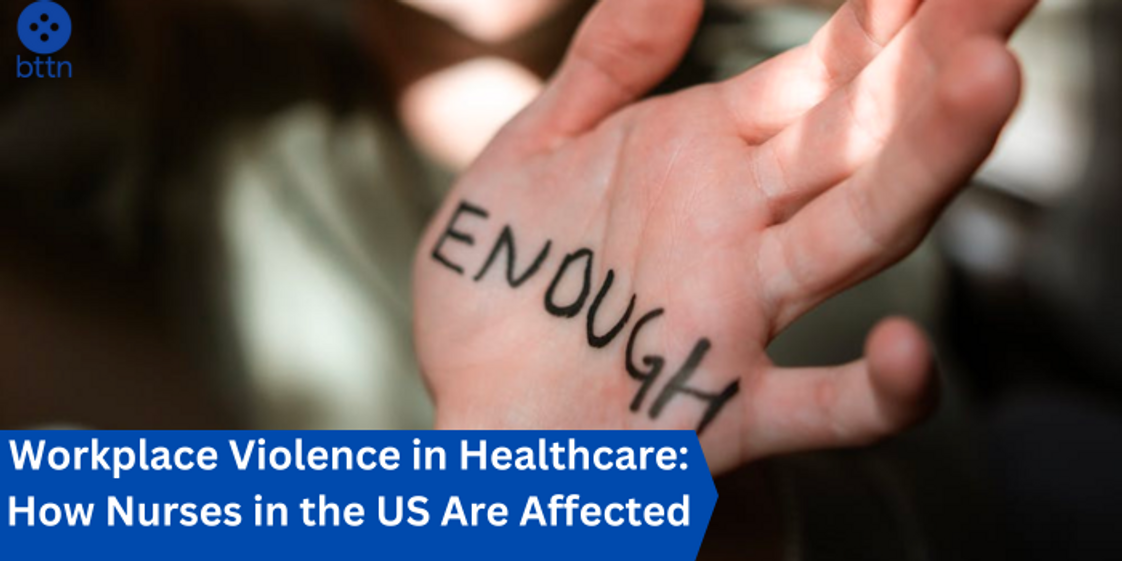
Workplace Violence in Healthcare: How Nurses in the US Are Affected
Posted by Pankaj Dhiman on Aug 18th 2023
Workplace Violence in Healthcare: The Impact on Nurses in the US
Workplace violence is a serious problem in the United States, and healthcare is one of the industries most affected. According to the National Institute for Occupational Safety and Health (NIOSH), healthcare workers are more likely to experience workplace violence than workers in any other industry.
Nurses are particularly vulnerable to workplace violence. A study by the American Nurses Association found that 77% of nurses have experienced some form of workplace violence in their careers.
The Impact of Workplace Violence on Nurses
Workplace violence can have a significant impact on nurses' physical and mental health. Physical injuries can range from minor bruises to serious injuries, such as broken bones or concussions. Mental health problems that can be caused by workplace violence include post-traumatic stress disorder (PTSD), anxiety, and depression.
In addition to the physical and mental health consequences, workplace violence can also have a negative impact on nurses' job satisfaction, morale, and productivity. It can also lead to nurses leaving the healthcare profession altogether.
Must Read - Nurses Need More Time With Patients: Here's Why
Types of Workplace Violence Faced by Nurses
Verbal Abuse: Nurses often encounter verbal abuse from patients or their families who may be under stress, frustration, or fear. This includes yelling, offensive language, and threats, leaving nurses emotionally distressed.
Physical Assault: Some healthcare settings may witness physical attacks on nurses, leading to injuries and trauma. These attacks can arise due to factors like long wait times, substance abuse, mental health issues, or delirium.
Emotional Abuse: Nurses may experience emotional abuse from colleagues or supervisors, impacting their self-esteem and overall job satisfaction.
Sexual Harassment: Regrettably, nurses may also face unwanted advances or inappropriate behavior from patients, visitors, or coworkers.
Risk Factors for Workplace Violence in Healthcare
There are a number of risk factors for workplace violence in healthcare, including:
- The type of healthcare setting: Violence is more likely to occur in certain types of healthcare settings, such as emergency departments, psychiatric units, and long-term care facilities.
- The patient population: Patients who are intoxicated, mentally ill, or under the influence of drugs are more likely to be violent.
- The nurse's role: Nurses who work in direct patient care are more likely to be exposed to violence than nurses who work in administrative or support roles.
- The nurse's personal characteristics: Nurses who are younger, female, or have a history of being bullied are more likely to be victims of workplace violence.
Must Read - The Perfect Storm Coming for Nursing in the United States 2023
Impact on Nurses and Patient Care
The repercussions of workplace violence on nurses are profound. Besides physical injuries, nurses may suffer from psychological trauma, anxiety, and even post-traumatic stress disorder (PTSD). Such conditions significantly impact their overall well-being, job satisfaction, and longevity in the profession.
Additionally, workplace violence affects patient care. When nurses are apprehensive or preoccupied with their safety, their ability to provide optimal care diminishes, compromising patient outcomes and overall quality of healthcare services.
Factors Contributing to Workplace Violence in Healthcare
Several factors contribute to the prevalence of workplace violence in healthcare settings, specifically targeting nurses:
High Stress Levels: Healthcare environments can be highly demanding, leading to frustration and aggression among patients and their families.
Limited Resources: Understaffing and inadequate resources may create tense situations, increasing the risk of violence.
Mental Health and Substance Abuse Issues: Patients with mental health disorders or under the influence of substances might act out unpredictably.
Long Working Hours: Exhaustion from long shifts can hinder nurses' ability to cope with confrontational situations.
Read Now - Travel Nurse Pay vs Staff Nursing: Which Is Right for You?
How to Respond to Workplace Violence in Healthcare
If you are a nurse who experiences workplace violence, it is important to report it to your supervisor or manager immediately. You should also seek medical attention if you have been physically injured.
Your employer is required to have a workplace violence prevention plan in place. This plan should include procedures for reporting and investigating incidents of violence, as well as steps to take to prevent violence from happening in the first place.
Supporting Nurses Who Have Experienced Workplace Violence
If you are a nurse who has experienced workplace violence, there are resources available to help you cope with the emotional and psychological effects. These resources may include counseling, support groups, or legal assistance.
The American Nurses Association also offers a number of resources to help nurses who have experienced workplace violence, including:
- The ANA's Workplace Violence Prevention Toolkit
- The ANA's Workplace Violence Resource Center
- The ANA's Workplace Violence Legal Hotline
Recommended Read - Nursing Shortage in 2023: A Growing Problem in the Healthcare Industry
The Future of Workplace Violence Prevention in Healthcare
There are a number of things that can be done to prevent workplace violence in healthcare. These include:
- Educating healthcare workers about workplace violence and how to prevent it.
- Creating a culture of safety in healthcare settings.
- Implementing workplace violence prevention policies and procedures.
- Providing training on how to respond to workplace violence incidents.
By taking these steps, we can help to create a safer workplace for nurses and all healthcare workers.
Conclusion
Workplace violence is a serious problem in healthcare, and nurses are disproportionately affected. There are a number of things that can be done to prevent workplace violence, including educating healthcare workers, creating a culture of safety, and implementing workplace violence prevention policies and procedures. By taking these steps, we can help to create a safer workplace for nurses and all healthcare workers.
Must Read -
